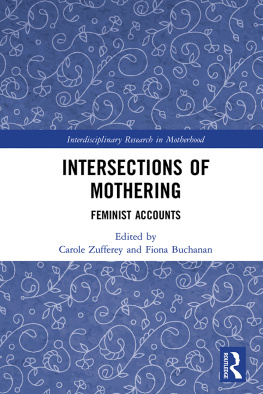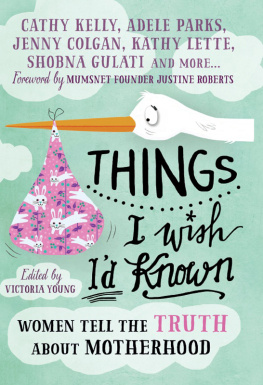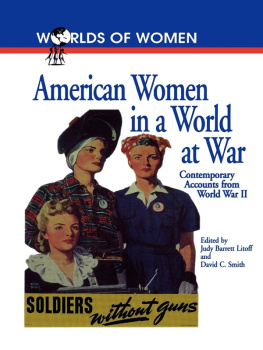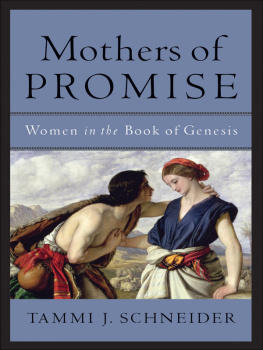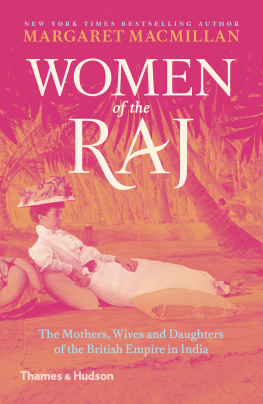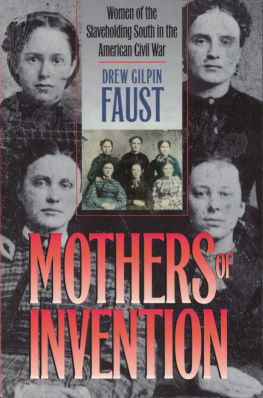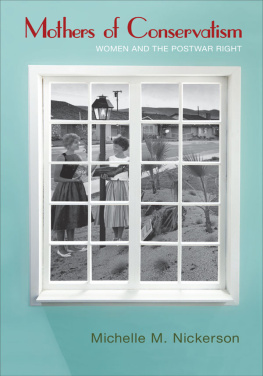
OUR MOTHERS WAR
American Women at Home and at the Front During World War II
EMILY YELLIN
FREE PRESS New York London Toronto Sydney

FREE PRESS
A Division of Simon & Schuster, Inc. 1230 Avenue of the Americas
New York, NY 10020
Copyright 2004 by Emily Yellin
All rights reserved, including the right of reproduction in whole or in part in any form.
Permission credits appear on p. 448
FREE PRESS and colophon are trademarks of Simon & Schuster, Inc.
For information about special discounts for bulk purchases, please contact Simon & Schuster Special Sales: 1-800-456-6798 or business@simonandschuster.com
Designed by Elliott Beard
Manufactured in the United States of America
1 3 5 7 9 10 8 6 4 2
Library of Congress Cataloging-in-Publication Data
Yellin, Emily.
Our mothers war: American women at home and at the Front during World War II / Emily Yellin.
p. cm.
Includes bibliographical references and index.
1. World War, 1939-1945WomenUnited States. I. Title.
D810.W7 Y45 2004
940.530820973dc22 2004040496
ISBN-13: 978-0-743-24514-2
eISBN-13: 978-1-4391-0358-6
www.SimonandSchuster.com
To CHRISTIE WATTS KELLY 1969-2002
For her unconditional love, wry humor, and unwavering belief in me and this book. My dear friend and guiding light, I miss you every single day.
And to ARABELLA KELLY and my godson GRAHAM KELLY
For showing me how devotion, attachment, and hope live on.
CONTENTS

PROLOGUE For Carol Lynn
Unearthing Our Mothers War Years
ONE To Bring Him Home Safely
Wives, Mothers, and Sisters of Servicemen
TWO Soldiers Without Guns
Female Defense Industry Workers
THREE Putting Up a Good Front
Female Entertainers, Fictional Characters, and Icons
FOUR This Mans Army
WACs
FIVE On Duty at Home
WAVES, SPARs, Marines, and WASPs
SIX Save His Life and Find Your Own
Volunteers, Land Army, Red Cross Girls, and Nurses
SEVEN Jane Crow
African-American Women
EIGHT Behind Enemy Lines
Spies, Propaganda Workers, and Those Who Worked for the Enemy
NINE A Question of Loyalty
Japanese-American Women
TEN Qualified Successes
Politicians, Journalists, Doctors, Baseball Players, and Other Professional Women
ELEVEN The Wrong Kind of Woman
Prostitutes, Unwed Mothers, and Lesbians
TWELVE A War Within the War
Right-Wing, Anti-Semitic Mothers Groups and Jewish-American Women
THIRTEEN Inside the Secret City
Wives and WACs in Los Alamos
EPILOGUE Their Legacy
Our Mothers War Years Resounding Through Our Lives
PROLOGUE

For Carol Lynn
UNEARTHING OUR MOTHERS WAR YEARS
A FTER MY MOTHER DIED in 1999, I was going through some of the things from her life that had made their way into my attic, when I came upon an old manila envelope I had never seen before, neatly labeled in my mothers handwriting, Saipan Diary and Pictures. I knew right away it was from the time my mother spent as a Red Cross worker in the Pacific during World War II. Carefully, I extracted a number of thin, yellowing pages with typewritten entries on both sides, and about thirty pictures, in black and white. As I read my mothers words, her familiar voice resonating once again, and as I saw my mothers youthful image, the cheerful smile she wore in every picture ever taken of her glowing still, I felt like an archaeologist, unearthing a precious past. And then, under another pile of papers, inside four shoeboxes labeled 1940s, I found hundreds of letters my mother had written home to her parents in Oklahoma during World War II. My grandmother had lovingly saved every one of them. I was becoming a prospector, discovering gold.
I already knew a lot of the details of her war years. In August 1942, eight months after the attack on Pearl Harbor and Americas entry into World War II, my mother, Carol Lynn Gilmer, had married Tom Heggen, a promising writer and an editor at Readers Digest. She had just finished her bachelors degree in history and masters degree in journalism at Northwestern University. After he joined the Navy, my mother was one of a couple of women hired in editorial jobs at Readers Digest in New York to replace the men, like her new husband, leaving for war. In 1945, the last year of the war, she quit her job, joined the Red Cross, and was sent to Saipan. Right around that time, Tom Heggen began sending chapters to her of a novel he was writing while serving aboard his Navy cargo ship in the Pacific. When the war ended, my mother did not go back to her editorial work right away, but instead tried unsuccessfully to devote herself to being a fulltime wife. After only a few months, in spring of 1946, she and Tom Heggen were divorced. Months later, the novel he had written, Mr. Roberts, was published. It centered around the crew of a supply boat in the Pacific, like the one on which he served, and the books dedication read, For Carol Lynn.
It went on to become a bestseller. The stage version won the 1948 Tony Award for best play. In 1955, the film version of Mr. Roberts, starring Henry Fonda, James Cagney, and Jack Lemmon, was nominated for best picture and won a best supporting actor Academy Award for Jack Lemmon. But in 1949, Tom Heggen was found dead, drowned in the bathtub of the New York apartment he was sharing at the time with writer Dorothy Parkers ex-husband, Alan Campbell. He had taken an overdose of sleeping pills.
Mom had talked to me about the pain of that marriage and her divorce and his death. But the happy ending was always that she moved on, met and married David Yellin, my father, her true love, a few years later, gave birth to my three older brothers and me, and continued a long editorial career at Readers Digest. I had not asked much else about her time during the war. It never came up. Like most of us, I had mostly known the war through my fathers stories of serving in the Army in Burma, not my mothers story.
Suddenly, sitting there on the attic floor, I was beginning to realize there were more dimensions in my mothers wartime experience than I knew. I saw that it had been a transforming time for her, a time when she first came into her own, exerted her courage and took advantage of new opportunities for herself, as a woman. In these letters and pictures, and her diary, I began to see the war through a new lens, a female perspective. It was an unfamiliar but intriguing view.
I found it in letters like the one to her parents dated January 4, 1945, in which my mother, then twenty-three, tried to explain her decision to leave Readers Digest and join the Red Cross.
Hope you can see how the Digest life is almost too perfect, with the world in the sorry mess its in. I just have to get out and try to do something active and direct when so many other people are doing so much. Its not enough for me to say that my husband is doing itand thats my part in the war. I want to do something myself. Do you see what I mean?
Next page

